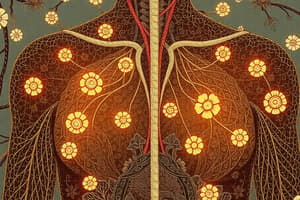Podcast
Questions and Answers
Lymph nodes are responsible for producing antibodies to fight infection.
Lymph nodes are responsible for producing antibodies to fight infection.
False (B)
The lymphatic system plays a crucial role in maintaining fluid balance in the body.
The lymphatic system plays a crucial role in maintaining fluid balance in the body.
True (A)
The spleen is a type of lymph node.
The spleen is a type of lymph node.
False (B)
Lymphatic vessels are responsible for absorbing fatty acids in the stomach.
Lymphatic vessels are responsible for absorbing fatty acids in the stomach.
The thymus gland is responsible for filtering out foreign substances from the lymph fluid.
The thymus gland is responsible for filtering out foreign substances from the lymph fluid.
The lymphatic system only plays a role in immune system regulation.
The lymphatic system only plays a role in immune system regulation.
The spleen is an endocrine organ that secretes hormones.
The spleen is an endocrine organ that secretes hormones.
Lymphatic vessels are responsible for the transportation of blood throughout the body.
Lymphatic vessels are responsible for the transportation of blood throughout the body.
The lymphatic system plays a role in the absorption of carbohydrates from the gut.
The lymphatic system plays a role in the absorption of carbohydrates from the gut.
Lymph nodes are responsible for filtering blood and returning it to the bloodstream.
Lymph nodes are responsible for filtering blood and returning it to the bloodstream.
The thymus gland is crucial to the production, maturation, and differentiation of immune B cells.
The thymus gland is crucial to the production, maturation, and differentiation of immune B cells.
The lymphatic system helps maintain fluid balance by collecting excess fluid from the tissues and returning it to the bloodstream.
The lymphatic system helps maintain fluid balance by collecting excess fluid from the tissues and returning it to the bloodstream.
Flashcards are hidden until you start studying
Study Notes
Lymphatic System
Overview
The lymphatic system is part of the immune system and plays a crucial role in maintaining fluid balance, absorption of fatty acids in the stomach, and immune system regulation. It is composed of a network of vessels, nodes, and ducts that circulate lymph, a colorless, watery fluid, throughout the body. Lymphatic organs include the spleen, thymus gland, and tonsils, which help produce lymphocytes and antibodies to fight infection.
Lymph Nodes
Lymph nodes are small, bean-shaped organs found in clusters throughout the body. They are part of the immune system and help filter out foreign substances, such as bacteria and viruses. Lymph nodes contain white blood cells called lymphocytes, which are responsible for fighting infection. When a lymph node is infected or inflamed, it may become swollen, indicating the presence of an infection or inflammation.
Immune Response
The lymphatic system plays a significant role in the body's immune response. It produces white blood cells called lymphocytes, which are involved in the production of antibodies that help fight infections. When a pathogen enters the body, lymphocytes recognize it as foreign and trigger an immune response. Lymph nodes help in this process by trapping pathogens in the lymph fluid and presenting them to lymphocytes, allowing them to mount an effective immune response.
Lymphatic Organs
There are several lymphatic organs in the body, including the spleen, thymus gland, and tonsils. The spleen is part of the lymphatic system and helps produce white blood cells and filter the blood to remove microbes. The thymus gland is an endocrine and lymphatic organ behind the sternum that secretes hormones and is crucial to the production, maturation, and differentiation of immune T cells. The tonsils produce lymphocytes and antibodies, helping to protect against inhaled and swallowed foreign bodies.
Lymphatic Vessels
Lymphatic vessels are a part of the lymphatic system and are responsible for the transportation of lymph throughout the body. They are thin-walled, blind-ending vessels that originate in the interstitial spaces of tissues. Lymphatic vessels collect lymph from the tissues and transport it to lymph nodes, where it is filtered and returned to the bloodstream.
Lymphatic System Function
The lymphatic system serves several important functions in the body. It helps maintain fluid balance by collecting excess fluid from the tissues and returning it to the bloodstream. It also plays a role in the absorption of fatty acids and fat-soluble vitamins from the gut. Additionally, the lymphatic system is essential for immune system regulation, as it carries lymphocytes to lymph nodes and allows them to interact with foreign substances, triggering an immune response.
Studying That Suits You
Use AI to generate personalized quizzes and flashcards to suit your learning preferences.




